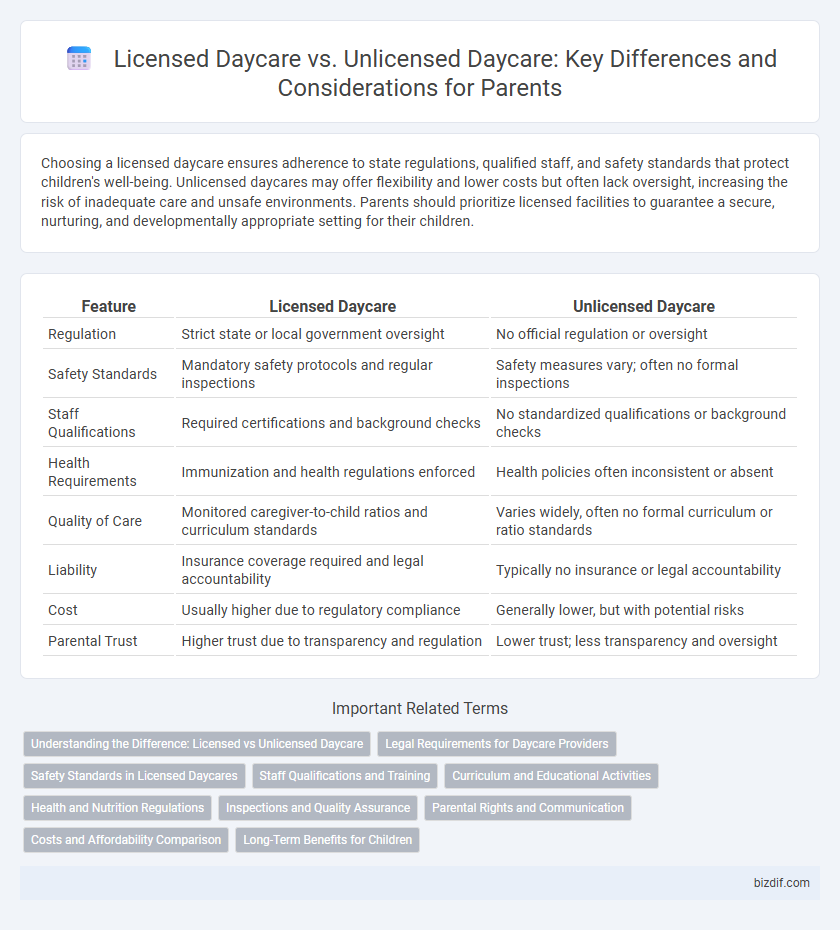Choosing a licensed daycare ensures adherence to state regulations, qualified staff, and safety standards that protect children's well-being. Unlicensed daycares may offer flexibility and lower costs but often lack oversight, increasing the risk of inadequate care and unsafe environments. Parents should prioritize licensed facilities to guarantee a secure, nurturing, and developmentally appropriate setting for their children.
Table of Comparison
| Feature | Licensed Daycare | Unlicensed Daycare |
|---|---|---|
| Regulation | Strict state or local government oversight | No official regulation or oversight |
| Safety Standards | Mandatory safety protocols and regular inspections | Safety measures vary; often no formal inspections |
| Staff Qualifications | Required certifications and background checks | No standardized qualifications or background checks |
| Health Requirements | Immunization and health regulations enforced | Health policies often inconsistent or absent |
| Quality of Care | Monitored caregiver-to-child ratios and curriculum standards | Varies widely, often no formal curriculum or ratio standards |
| Liability | Insurance coverage required and legal accountability | Typically no insurance or legal accountability |
| Cost | Usually higher due to regulatory compliance | Generally lower, but with potential risks |
| Parental Trust | Higher trust due to transparency and regulation | Lower trust; less transparency and oversight |
Understanding the Difference: Licensed vs Unlicensed Daycare
Licensed daycare facilities meet state regulations for health, safety, staff qualifications, and child-to-staff ratios, ensuring a standardized level of care and protection. Unlicensed daycare centers operate without state oversight, which may result in inconsistent care quality, fewer safety protocols, and limited accountability. Choosing a licensed daycare provides parents with added security and assurance that their child is in a regulated and monitored environment.
Legal Requirements for Daycare Providers
Licensed daycare providers must comply with strict legal requirements including staff-to-child ratios, safety regulations, background checks, and health standards mandated by state or local authorities. Unlicensed daycare centers often operate without formal oversight, potentially neglecting essential regulations such as sanitation protocols and caregiver qualifications. Legal compliance ensures child safety, quality care, and eligibility for government funding or subsidies in licensed facilities.
Safety Standards in Licensed Daycares
Licensed daycares adhere to strict state-mandated safety standards, including regular inspections, background checks for staff, and enforced child-to-caregiver ratios, ensuring a secure environment for children. These facilities must comply with health protocols, emergency preparedness plans, and maintain proper sanitation to minimize risks. In contrast, unlicensed daycares often lack such oversight, potentially compromising child safety and well-being.
Staff Qualifications and Training
Licensed daycare centers require staff to meet state-mandated qualifications, including certifications in early childhood education, first aid, and background checks, ensuring a higher standard of care and safety. Unlicensed daycare providers often lack formal training and may not adhere to consistent staff qualification requirements, potentially affecting the quality of supervision and child development support. Research shows that children in licensed daycare settings benefit from structured learning environments led by qualified professionals, promoting better social and cognitive outcomes.
Curriculum and Educational Activities
Licensed daycare centers follow state-mandated curricula designed to promote early childhood development through structured educational activities that enhance cognitive, social, and motor skills. Unlicensed daycare providers often lack standardized curricula, resulting in less consistent educational experiences and limited focus on developmental milestones. The presence of professionally trained staff in licensed settings ensures age-appropriate learning strategies that foster school readiness.
Health and Nutrition Regulations
Licensed daycare centers adhere to strict health and nutrition regulations, including regular inspections, proper food handling, and ensuring balanced meal plans that meet dietary guidelines for children. Unlicensed daycares often lack oversight, increasing risks related to poor sanitation, inadequate food safety measures, and insufficient nutritional standards. Compliance with state or local health codes in licensed facilities significantly reduces the likelihood of illness and promotes healthy development among young children.
Inspections and Quality Assurance
Licensed daycare centers undergo regular inspections by state or local regulatory agencies to ensure compliance with health, safety, and staff qualification standards. These inspections focus on maintaining high-quality environments, staff-to-child ratios, sanitation, and emergency preparedness, providing a reliable measure of quality assurance. Unlicensed daycares lack formal oversight, increasing the risk of substandard care and limited accountability for safety and educational standards.
Parental Rights and Communication
Licensed daycares ensure adherence to state regulations that protect parental rights, including clear communication protocols and access to children's daily activities and developmental progress. Unlicensed daycares may lack standardized reporting and transparency, making it harder for parents to monitor their child's care and intervene effectively. Parents choosing licensed facilities benefit from established grievance procedures and regular updates, fostering trust and accountability.
Costs and Affordability Comparison
Licensed daycare centers typically have higher costs due to regulatory compliance, staff qualifications, and safety standards, averaging $200 to $400 per week. Unlicensed daycare providers often offer more affordable rates ranging from $100 to $250 weekly, but may lack formal training and oversight. Families should weigh affordability against quality and safety when choosing between licensed and unlicensed care.
Long-Term Benefits for Children
Licensed daycare centers provide structured environments with trained caregivers, ensuring adherence to safety standards and developmental curricula that promote cognitive and social growth in children. Studies show children in licensed facilities demonstrate higher school readiness, enhanced language skills, and better emotional regulation compared to those in unlicensed settings. Long-term benefits include improved academic performance and increased social competence, supporting overall child well-being and success.
Licensed daycare vs unlicensed daycare Infographic

 bizdif.com
bizdif.com